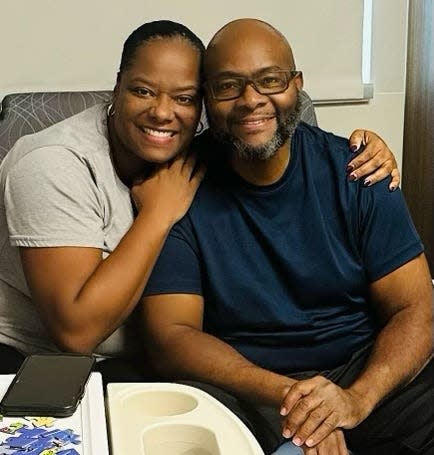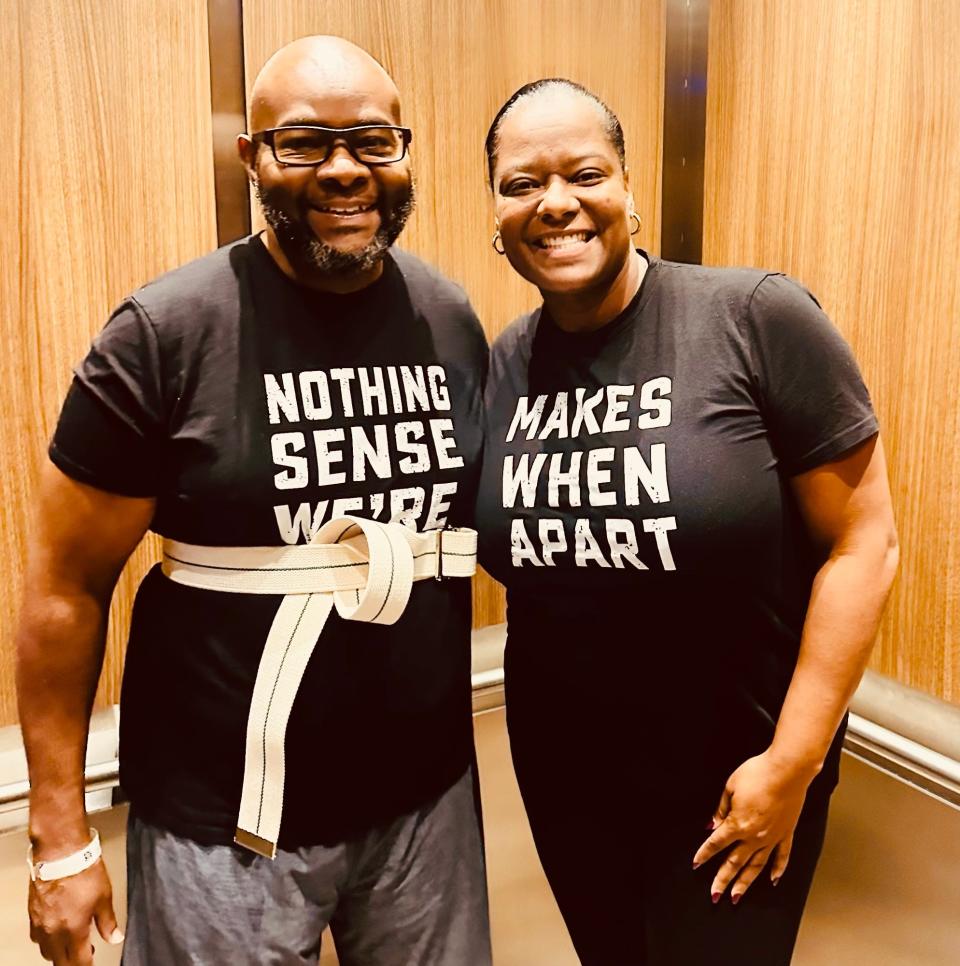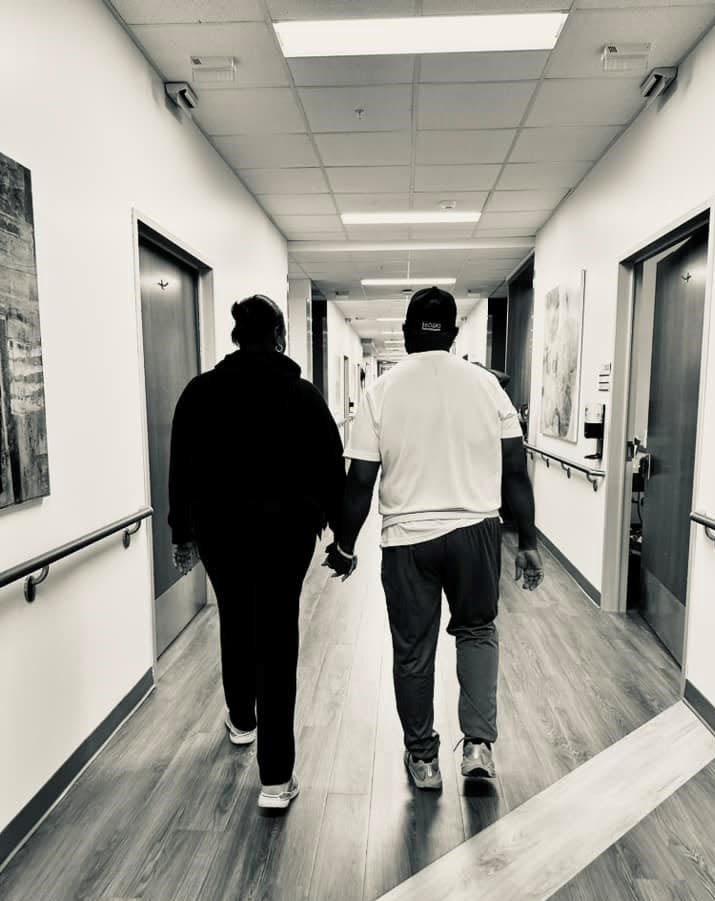Woods: For Lakesha and Greg Burton, this isn't a sad story. It's a chapter in love story.

On a recent day, as Greg Burton made his way through what has been his daily routine lately, hours of therapy at Brooks Rehabilitation, he wore a black T-shirt with three words in white lettering.
NOTHING
SENSE
WE’RE
His wife, Lakesha Burton, gave him the T-shirt. And on that day, she wore an almost matching black T-shirt, with three different words in the same lettering.
MAKES
WHEN
APART
With her at his side — which is where she’s been since what happened Sept. 29 — the words on their T-shirts came together in a way that seemed particularly fitting.
NOTHING MAKES
SENSE WHEN
WE’RE APART
“The shirt tells it all, right?” Lakesha said the next day.

On this day, she was wearing a T-shirt that says “#blessed” and sitting next to Greg on the edge of the bed at the rehab center. They’ve always been “all lovey-dovey,” she says. And that hasn’t changed.
When she pulled up photos of the T-shirts on her phone, Greg grinned, shrugged the way many a husband has shrugged when a wife has suggested they wear something, raised his palms and then added something to what she has said.
Only his words, while making sense in his head, came out of his mouth garbled.
And yet, even if his wife doesn’t completely understand what he's saying, she understands.
They both laughed and continued, in their own way, with words and gestures, explaining that theirs isn’t a sad story.
“This is no pity party,” she said. “We’re going to get through this. A couple of friends came here and they were like …”
She made a somber face.
“I was like straighten up your face,” she said. “Don’t feel sorry for us. We are grateful. I’m grateful for my husband’s life. I’m grateful to be able to see our future, to have another opportunity with my honey.”
They exchanged a look that didn't need any words.
Spend some time watching them together — and during the last month they’ve rarely been apart — and you realize this isn’t just a matter of putting on a happy face.
You believe her, believe them, when they make it clear this isn’t a sad story.
You eventually realize that, at its core, it’s a love story.
'Do you know who I am?'
This isn’t to say there haven’t been some challenging moments in the last month.
Go back to the last Friday morning in September.
They had little reason to believe anything was wrong. Greg is 59 years old. He had just had his annual physical a couple of weeks earlier. The day before they’d both been at the Read USA annual luncheon. When Rob Kelly, head of the organization, had asked for people to come forward and join arms, in a room full of hundreds of people, Greg was the first one to jump out of his chair.
On this Friday morning, she had just left the house for her relatively new job. After 24 years with the Jacksonville Sheriff’s Office, she ran for sheriff, losing to T.K. Waters, before being hired by Mayor Donna Deegan to be director of community initiatives.
He was getting ready to go to the job he took after his long JSO career — Duval County Public Schools police chief.
On her way to work, they talked on the phone. This wasn’t unusual. She says they talk frequently every day. On this day, she hung up and a few minutes later got a call.
Her 20-year-old son was home and noticed something didn’t seem right with Greg. When he started to fall, he caught him and called 911.
It was a stroke. First responders rushed him to Baptist South, where he was given a shot and put on a Life Flight to Baptist Medical Center downtown.
When Lakesha got the call about what had happened, they told her to head there, and to drive carefully. By the time you arrive, she was told, he’ll be out of surgery.
And he was. When she got the hospital, they already had removed the blood clot from his brain. He was alive. But the right side of his body was paralyzed. And that wasn’t the hardest part for his wife.
It was that he didn’t know who she was.
“My prayer was just, ‘Lord, I know he can’t talk, but just give me a sign that he knows who I am,” she said. “I waited and waited and waited. I didn’t sleep for about three days. Every time he opened his eyes, I was in his face, saying, ‘Do you know who I am?’”
Partners against crime and for each other
They first met nearly 20 years ago. That’s when she did something out of character for her. She worked up the nerve to ask him out on a date.
“And he rejected me,” she said, laughing about it now.
He said he was dating someone. Her sister said his rejection actually was a good sign. He was being respectful. Not that she could easily see it that way then.
Spin ahead about three years. They ran into each other at a conference. They both were single. She didn’t ask him out this time. But knowing he was a good guy, she told him she was a little tipsy (even if this wasn’t exactly true) and asked if he’d be willing to give her a ride home. He said he would. She recalls that on the way, he was quite serious, telling her how as a young officer, even off-duty, you don’t want to get into trouble.
She also recalls their first kiss. They ended up near the airport, sitting there watching the planes take off and land, with him going on and on about flying and all kinds of other things. She eventually interrupted him and said: “Can we kiss? I need to know if this is going to be deal-breaker.”
Or at least that’s her version of the story. When she tells it, she laughs because he looks at her in a way that says his version might be different. But the bottom line is the same. They’ve been together since.
They got married 15 years ago, blending their families, her two boys and his two girls, and then having a son together, who is now 13.
During their careers at JSO, they both became assistant chiefs. She believes they’re the first such husband-and-wife combo in the force’s history. He was a zone commander for Zone 6 on the Northside, she was a zone commander for Zone 2 in Arlington. She credits him with being a mentor, helping her become the cop she became, respected enough that she could become the first Black woman to run for Jacksonville sheriff.
But while the public saw the professional success they had separately, that always was superseded by the private triumphs they had together.
“Greg was my first real relationship,” she said. “I always had bad relationships. When I met him, I was so broken on the inside. I felt like he deserved better than me. He’s such a good man. And I had to learn how to accept a good man, someone who will respect and love me. I laid everything on the line with him. And he accepted all my faults, all my past, all my weaknesses.”
She has all kinds of examples of what makes him a good man. Some are of little things, like simple acts of courtesy in a grocery store. Others are big ones. Like when her identical twin was dying five years ago.
She watched Greg sit at that bedside for hours, holding her twin’s hand — and it was like getting a glimpse of what he’d do for her.
And so when this happened to him, and others kept telling her she needed to take care of herself, she explained that being right next to him, sleeping in his hospital room — or in their first few days staying awake in his hospital room — was exactly what she wanted to do, what she needed to do.
“That’s what the vows mean, right?” she said. “That’s what it means to be husband and wife. I know he would do this for me.”
Another kiss
It was the fourth day after the stroke, at 9:57 p.m. Lakesha knows the time because she wrote it down later in her journal.
She was sitting at his bedside at Baptist and said, “Squeeze my hand if you know who this is.”
Greg squeezed her hand and opened his eyes.
“Give me a kiss,” she said.
He puckered his lips.
That kiss was even better than the first one. That’s when she felt like things were going to be OK.
It has been a month since then — they celebrated their 15th anniversary in the hospital — and she has seen progress every day.
In those early days, she’d tell him she was his wife. And then to emphasize the point, she’d cross her index and middle finger, squeezing them together, and say: “You and me, we’re like this.”
He’d get discouraged during some rehab and she’d pull up her sleeve, flex her bicep and say, “You’re strong.”
She’d put her hands together, making a heart.
He moved to Brooks more than a week ago, had a bit of a setback and ended up in the ICU, but returned to the rehab facility and continues to improve every day.
In those first few days, the doctors told her to watch his right side to get a sense of what his recovery would be like. He not only began using that side of his body again, in so many ways, he became himself again. His expressions, his mannerisms, his unselfish kindness.
“It's really been a spiritual journey for me because while his body has been impacted, his spirit, his soul, has not been impacted,” she said.
Leaving City Hall
On Oct. 24, the mayor’s office issued a press release saying Lakesha Burton had resigned from her position due to her husband’s unexpected health issues.
As had been the case for weeks, she slept in Greg’s room that night. But she slept particularly well that night.
“I had the mayor’s blessing, and I closed that chapter,” she said. “I felt like that burden of me trying to balance both was gone. … I left for love. I just love and adore Greg Burton. Every day I wake up and we have a praise dance. I want to seize every moment I have with him.”
She says that what happened about a decade ago helped prepare her to handle this. Greg had a series of health issues, including colon cancer and open-heart surgery.
So when this happened, she says: “I knew first of all to calm down and just depend on God.”
The part she wasn’t prepared for was the outpouring of support. The first few days she heard from hundreds of people. It was overwhelming, to the point where she had to strictly limit visitors to the ICU. But it also was overwhelming in an uplifting way.
“You know how they said when you do good it comes back to you?” she said. “I always believed that. But I felt it in those days.”
A friend set up a GoFundMe page that, as of Friday, had raised more than $30,000. They have medical insurance. But some of what they plan to do once Greg can go home (as of now, his release date is in mid-November) — like returning for some intensive aphasia therapy — won’t be covered. So while they didn’t ask for the money, they are appreciative of it. And beyond that, they’ve been appreciative of all the emotional support. Hundreds of cards and letters. A jersey from the Jaguars. Countless calls and texts.

In the days and weeks after the stroke, without getting into much detail about what had happened, she kept people updated by posting pictures on Facebook. Their faces pressed together, a couch pushed alongside his bed, their four feet together in hospital socks while watching a Jags game, them walking down a hall holding hands.
More than one person responded to the images by saying: “This is what love looks like.”
Putting the pieces together
Lakesha has kept the number of visitors very limited. But on this day, they have a special one — former Sheriff Nat Glover.
She credits him with giving her a chance to be a police officer. And when he enters the gym, Greg’s face lights up.
Greg is standing on a high-tech version of a bosu ball — a half a large rubber ball underneath a platform — and trying to balance. Anyone who does this in a gym will tell you it isn’t easy, even if you haven’t had a stroke.
After Lakesha and a couple of physical therapists help him off the ball, he moves to something more fun — a game of cornhole.
A therapist hands him four red bean bags.
He firmly plants his feet on the solid ground and using his right hand — the same hand that about a month ago wasn’t moving — starts tossing the bags toward the board, positioned in front of a wall with a message for patients: “Your destiny is beyond today.”
Each bag is on target, but lands on the floor short of the board.
The therapist asks if he wants to move closer. He does not. He takes the four blue bags and switches to his left hand. This time two of his tosses land with thuds on the board. He raises his palms and grins.
Walking back to his room — walking briskly — he bumps into his speech therapist. She tells him how well he did that day and says she’ll see him the next.
He says something and puts his two hands together, forming a heart.
In the gym, Glover signed a copy of his book and gave it to Greg. They chatted for a while. They smiled and laughed. Afterward, Glover told Lakesha how good Greg looks, how well he’s walking. And he asked her one of the questions I had: Can she understand what he’s saying when he talks?
“Some things I do,” she said. “And a lot of is because I'm so emotionally connected to him.”
Sometimes it’s basic things, like when they get back to his room and sit on the bed and he says something and she knows that he’s asking to have the blinds lowered. Often it’s larger things, like his gratitude — for her, for the doctors and nurses, for God, for everyone who has brought him this far.
In the room, there’s a 300-piece puzzle of a map of the United States. He’s been working on putting it together. Next to the puzzle pieces, there’s a small photo, the kind that you might find in a wallet. A family photo from when all of the kids — now between 13 and 35 — were younger.
Lakesha shows Greg the photo and asks him to write the kids’ names.
They play UNO, the numbers and colors making this more than a way to pass the time. It’s another form of therapy.
“The more the brain repairs itself, the more he remembers, and the more he’s able to do,” she said. “It’s fascinating.”
There is reason to be optimistic about the speech coming back — partly because of what the doctors say about how the brain heals, but also because of what she has seen and heard happen already.
The other day when Greg did something to help a nurse, the nurse said, “Thank you.” And he responded, clear as can be, “You’re welcome.”
To see just how far he has come in one month gives everyone hope for how far he will go — how far they will go — in the coming months.
Sitting in his room, she says she’s done with politics. When the former sheriff hears her say this, he tells her to never say never. He recalls how his experience as a teenager during Ax Handle Saturday made that the worst day of his life — and adds that, because of how it led to so much of what he did the rest of his life, it also was paradoxically one of the best days of his life.
She thanks him for this advice. She certainly can understand bad events leading to good. This past month has made her grateful for the little things that we often take for granted.
She also knows she’s doing exactly what she wants to be doing. No regrets. No pity party.
Those T-shirts with the words that separately don’t make sense — sold online as “silly and cute” novelty items — seem silly and cute and profoundly fitting when Greg and Lakesha Burton wear them.
Everything makes sense when they’re together.
The GoFundMe page for the Burton family can be found at: www.gofundme.com/f/greg-and-lakesha-burton-family
mwoods@jacksonville.com, (904) 359-4212
This article originally appeared on Florida Times-Union: Jacksonville law-enforcement couple grateful for each other, community

